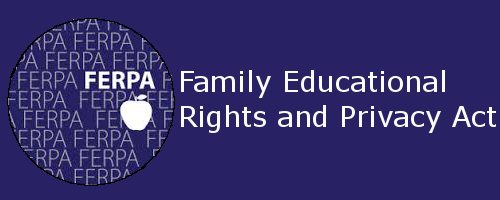
FERPA
The Family Educational Rights and Privacy Act (FERPA) affords students certain rights in regards to their educational records. They are:
1. The right to inspect and review the student’s educational record within 45 days of the day the College receives a request for access.
Students should submit to the registrar, dean, and head of the academic department, or other appropriate official, written requests that identify the record(s) they want to inspect. The College official will make arrangements for access and notify the student of the time and place where records may be inspected. If the records are not maintained by the College official to whom the request was submitted, that official shall advise the student of the correct official to whom the request should be addressed.
2. The right to request the amendment of the student’s education records that the student believes are inaccurate or misleading.
Students may ask the College to amend a record that they believe is inaccurate or misleading. They should write the College official responsible for the record, clearly identify the part of the record they want changed, and specify why it is inaccurate or misleading.
If the College decides not to amend the record as requested by the student, the College will notify the student of the decision and advise the student of his or her right to a hearing about the request for amendment. More information about the hearing procedures will be provided to the student when notified of the right to a hearing.
3. The right to consent to disclosures of personally identifiable information contained in the student’s education records, except to the extent that FERPA authorizes disclosure without consent.
Generally, schools must have written permission from the eligible student to release any information from a student’s education record. But, FERPA allows schools to disclose those records, without consent, to the following parties or under the following conditions:
- School officials with legitimate educational interest;
- Other schools to which a student is transferring;
- Specified officials for audit or evaluation purposes;
- Appropriate parties in connection with financial aid to a student;
- Organizations conducting certain studies for or on behalf of the school;
- Accrediting organizations;
- To follow a judicial order or lawfully issued subpoena;
- Parents of a dependent student, as defined by Section 152 of the Internal Revenue Code of 1954;
- Appropriate officials in cases of health and safety emergencies; and
- State and local authorities, within a juvenile justice system, pursuant to specific State law.
4. The right to file a complaint with the U.S. Department of Education about alleged failures by Berea College to follow the requirements of FERPA.
The name and address of the office that administers FERPA is:
Family Policy Compliance Office
U.S. Department of Education
600 Independence Avenue, SW Washington, DC 20202-4605
Directory Information
At its discretion, Berea College may provide directory information under the provisions of the Family Education Rights and Privacy Act. Directory information is defined as that information which would not generally be considered harmful or an invasion of privacy if disclosed. Designated directory information at Berea College includes the following:
- Student name
- Addresses and email address
- Student B number
- Enrollment status (full-time, part-time)
- Classification (Fr, So, Jr, Sr)
- Dates of attendance
- Major field of study
- Participation in officially recognized activities and sports
- Weight and height of members of athletic teams
- Degrees and awards received
- Photographic, video or electronic images of students taken and maintained by the college
- Hometown
More Information
As of January 3, 2012, the U.S. Department of Education’s FERPA regulations expand the circumstances under which students’ education records and personally identifiable information (PII) contained in such records–including Social Security numbers, grades, or other private information–may be accessed without consent. First, the U.S. Comptroller General, the U.S. Attorney General, the U.S. Secretary of Education, or state and local education authorities (“Federal and State Authorities”) may allow access to student records and PII without consent to any third party designated by a Federal or State Authority to check a federal- or state-supported education program. The evaluation may relate to any program that is “principally engaged in the provision of education,” such as early childhood education and job training, as well as any program that is administered by an education agency or institution.
Second, Federal and State Authorities may allow access to education records and PII without consent, to researchers performing certain types of studies, in certain cases even when the College objects to or does not request such research. Federal and State Authorities must get certain use-restriction and data security promises from the third parties that they allow to receive PII, but the Authorities need not maintain direct control over the third parties.
Also, in connection with Statewide Longitudinal Data Systems, State Authorities may collect, compile, permanently keep, and share without student consent, PII from education records, and may track student participation in education and other programs by linking such PII to other personal information that they get from other Federal or State data sources, including workforce development, unemployment insurance, child welfare, juvenile justice, military service, and migrant student records systems.
If a student believes the college has failed to follow FERPA, they may file a complaint using the Student Complaint and Grievance Procedure as outlined in the Student Handbook. If dissatisfied with the outcome of this procedure, a student may file a written complaint with the Family Policy Compliance Office, U.S. Department of Education, 400 Maryland Avenue SW, Washington, D.C. 20202-5920.
Questions about the application of the provisions of the Family Educational Rights and Privacy Act should be directed to the Office of the Registrar or to the Office of the General Counsel. The FERPA Quick Guide document may be good reference material for you.
For more information about FERPA, contact the Family Policy Compliance Office